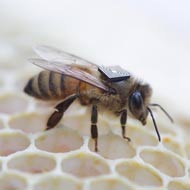
Global project hopes to identify threats to honey bees
Honey bees are being fitted with micro-sensors as part of a global initiative to help save the species.
Research organisation CSIRO is heading up the project, which is formed of beekeepers, farmers, researchers, industry and technology companies.
Collaborators hope to find out what is harming bees and come up with solutions to protect them.
We are dependent on honey bees to pollinate a third of the food we eat, including fruit, vegetables, oils, seeds and nuts. Yet as a species they are facing serious threats.
Micro-sensors will be used to monitor bee movements in and around hives. As bees are predictable creatures, behavioural changes are often a sign of stress.
CSIRO science leader Paulo de Souza said: "The tiny technology allows researchers to analyse the effects of stress factors including disease, pesticides, air pollution, water contamination, diet and extreme weather on the movements of bees and their ability to pollinate.
"We're also investigating what key factors, or combination of factors, lead to bee deaths on mass."
Image © CSIRO



 The Animal and Plant Health Agency (APHA) has updated its online reporting service for dead wild birds.
The Animal and Plant Health Agency (APHA) has updated its online reporting service for dead wild birds.